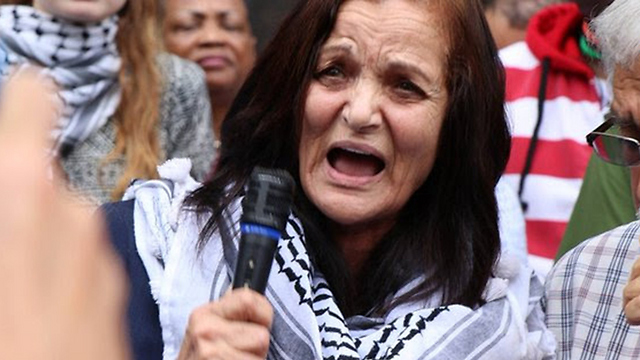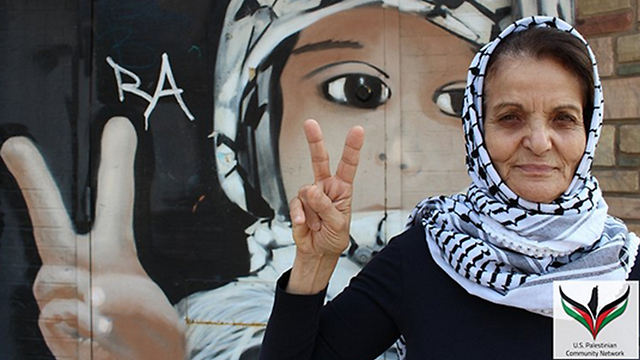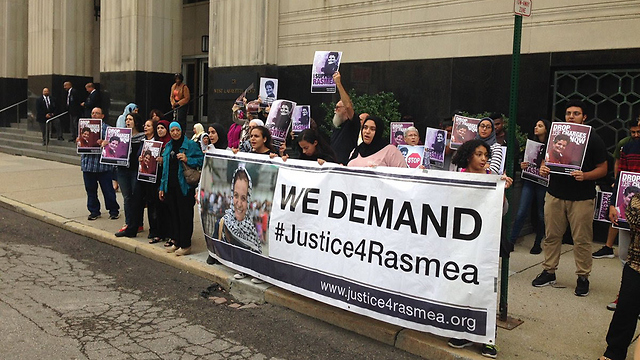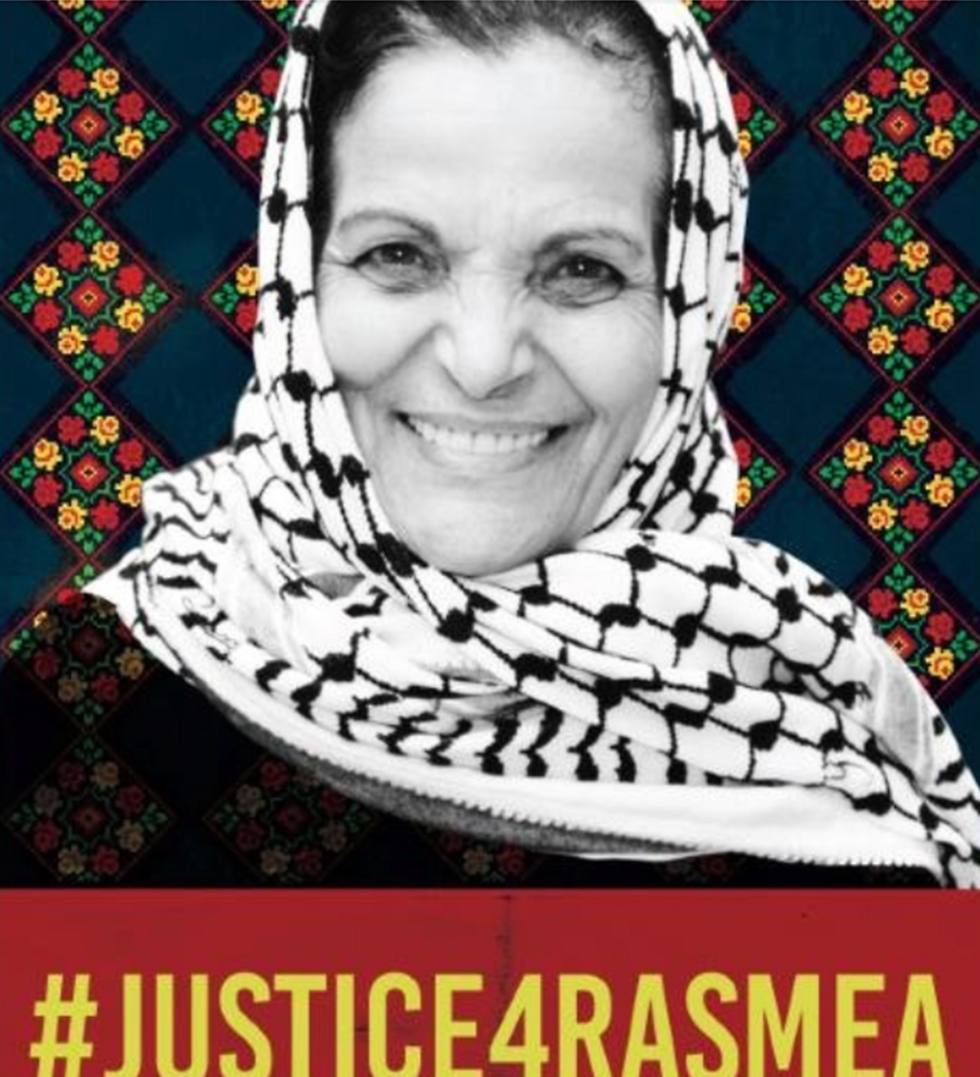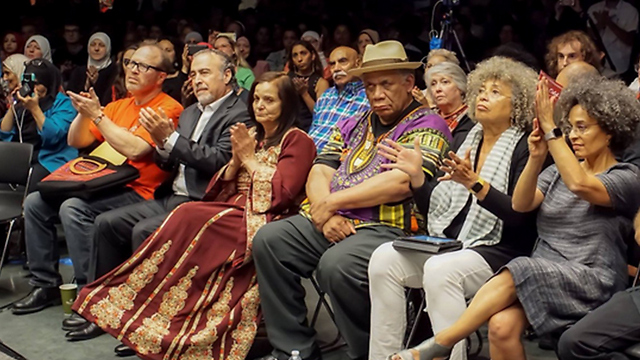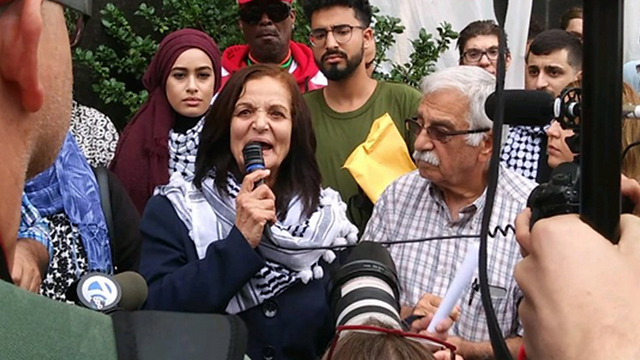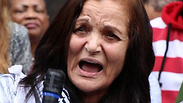
Twenty-three years after arriving in the land of endless possibilities, Rasmea Yousef Odeh was ordered to leave the United States without returning.
Odeh, who was born in the village of Lifta near Jerusalem, was found responsible for the murder of two Israeli civilians in a terrorist bombing at a supermarket in the capital on February 21, 1969.
On Thursday, a federal judge has ruled that the Palestinian terrorist will have to leave the country she has lived in for more than two decades on September 19, forcing her to start her life anew in Jordan.
Thus ended a long legal battle conducted by Odeh, 70, against the local immigration authorities who demanded her expulsion—not because of her terrorism conviction, but because of her conviction in fraud. Her attempt to conceal her past failed as it returned to haunt her in the US.
As a young activist in the ranks of the Popular Front for the Liberation of Palestine (PFLP), she was sent to a Jerusalem supermarket to plant an explosive charge in a candy bag. The explosion took the lives of two Israeli students in their early 20s, Leon Kanner and Eddie Joffe, and wounded nine others.
After being captured, she was charged with murder and sentenced to life imprisonment. In March 1979, she was released as part of a prisoner exchange deal to release captive soldier Avraham Amram, and was deported from Israel to Jordan.
Fifteen years later she immigrated to the United States, and in 2004 received her American citizenship. Now Odeh is forced to relinquish it as part of a plea bargain which seals the long legal battle waged by her against the authorities.
Acted for women—and attacked Israel
Over the years, as an American citizen in the city of Chicago, Odeh has invested heavily in community activism and was one of the organizers of "A Day Without a Woman" which takes place on March 8, continuing the tradition of the women's march in Washington.But while part of her time was devoted to women's rights, most of it was invested in the Arab American Action Network (AAAN), where she served as an associate director. In this framework, Odeh frequently attacked the State of Israel, accusing the state of racial segregation, discrimination and war crimes against the Palestinian people.
This activity may have been the thing to expose her to the authorities.
In 2010 FBI agents raided the organization's offices and interrogated some of its members as part of an investigation. None of them has been convicted of criminal activity, but some of the documents that were seized revealed that Odeh failed to disclose in her immigration application documents that she was a convicted felon, effectively defrauding the authorities and committing a federal offense.
An indictment was filed against her, and in November 2014 she was convicted of immigration fraud and sentenced to 18 months in prison, at the end of which she would be deported.
"We did not find justice in this court," Odeh commented at the time.
Odeh decided to file an appeal against her conviction, and it was accepted—in part because Odeh, who initially claimed that she did not declare her dubious past because she did not know English at the time, changed her version: This time she testified that she hid the information because of her unstable psychological condition at the time, which she claimed was caused by post traumatic stress after he experiences in an Israeli prison, claiming that she was tortured and even raped during her interrogation.
The court that accepted her appeal ruled that Odeh would be retried in 2016.
It was a great victory for her and her defense team. Her victory in the court led to a wave of demonstrations in her support. Pro-Palestinian organizations were motivated, and through protests and petitions of various kinds, sought to put pressure on the retrial.
Among other things, her supporters accused the immigration authorities of acting politically motivated on behalf of Israel, and demanded that the proceedings be halted, stating that " Rasmea Odeh is a freedom fighter" and that "resisting the occupation is not a crime."
In total disregard of her past as a terrorist, the pro-Palestinian organizations branded her a freedom fighter.
However, despite their spirit, in March of this year, Odeh decided to waive the retrial and sign a plea deal with the prosecutor Jonathan Tokel—mainly because she claims that the authorities have the authority to deport her, even if she is found innocent.
The plea deal paved the way for the revocation of Odeh's citizenship and her deportation in three weeks, but as part of it she will not serve a prison sentence.
"From the start, this was a case of political persecution," said Odeh's lawyer, pointing an accusing finger at attorney Tokel. "Usually, given her twenty years of community activism, she would have been reprimanded but not indicted. The reason they decided to do so was because they wanted her to stop doing her work.
"The prosecutor who made the decision is a very pro-Israel guy connected to Zionist activity in the United States. He was determined to go through with it, and his motivation was political."
According to Odeh's lawyer, Israeli officials were involved in the legal process.
"In order to win this case, the plaintiffs had to present old documents from the IDF and the Israel Police, and they could not have obtained them without the cooperation of the Israeli government, which provided them with the relevant paperwork."
He also mentions the members of the Israeli "Shurat HaDin" organization, headed by Nitsana Darshan-Leitner, who praised the prosecutor, Tokel: "He pursued Odeh with determination, revealed her lies and ensured that her families of her victims would have justice and closure."
The family of Eddie Joffe, who lost his life in the attack for which Odeh was convicted, was active in the efforts to increase awareness of Odeh's terrorist past. Eddie's niece, Terry Joffe Benaryeh wrote a column for the American news site The Huffington Post, in which she refuted Rasmea Odeh's saintly image. Her father, Basil Yoffe, was also present at the hearings and maintained contact with the prosecution.
"We have no desire to confront the relatives of those murdered," Odeh's lawyer told Ynet. "There is no dispute that they lost their relatives, we respect that. Rasmea always claimed that she was innocent of that crime, and that she was not involved in the attack."
In response, Harold Yoffe, the late Eddie's brother, dismissed the lawyer's comments.
"The legal system in Israel determined that she was responsible for the murder, and a representative of the Red Cross confirmed that the trial was fair. Her claim of torture was also completely refuted, as she confessed to her actions within a very short period of time, and her accomplices confirmed that she was the perpetrator who carried out the attack, as well as an attempted bombing at the consulate.
"With regard to the charges in the US, it is absolutely clear that she is guilty of fraud. In fact, all her defense was based on turning her from a murderer into a poor, hurt woman, even mobilizing activism organizations for this purpose."
Enlisting the support of a Jewish leftist organization
The attempt by Odeh and her team to move the campaign from the criminal court to the political arena did not succeed in keeping her in the US, but it fed the pro-Palestinian organizations and the campaigns they initiated under the slogan "Justice4Rasmea."
Since the plea deal was filed in April, Odeh's supporters have been hanging on what they say is a victory in public perception. "Rasmea Odeh—a symbol of the Palestinian liberation movement— is now a name that is known throughout the social justice movement in the United States," they said.
Indeed, many enlisted for her in the Afro-American community in Chicago, including Angela Davis, one of the well-known leaders of the Black Panthers in the United States in the 1960s.
Among the supporters was the Jewish Voice for Peace organization, which even invited Odeh to speak at an event in April, a few days before the plea deal was made.
"When I came to the United States and turned it into my second home, I thought it would be my last stop in the tribulation I had shared with the Palestinian people since the Nakba and the 1967 occupation," Odeh said in her speech. "Now I face a similar Nakba, where I am forced to leave the country and the life I built for myself for 23 years in the United States, but I will continue my struggle for justice for my people wherever I go."
Even when her plea deal was approved on August 17, Odeh didn't miss the chance to slam Israel.
At the end of the court hearing, Odeh insisted on making a political statement. The judge interrupted her several times before threatening to accuse her of contempt of court, and she had to carry out her speech on the steps outside in front of demonstrators, journalists and television cameras.
Although the case against her deals with her defrauding the American immigration authorities, Odeh chose to use the stage not to defend herself but to attack the "Zionist entity", which "has no right to exist as a racist state of white settlers."
Odeh again claimed that she had been abused by the Israeli security forces and determined that the United States was a partner to these war crimes.
"Every Israeli government is moving more and more toward the extreme right, and Benjamin Netanyahu is the worst of them," she declared, linking the events in Charlottesville to what is happening in the territories. "When I saw the racist whites marching in Virginia, all I could think of was the white settlers burning Palestinian children or marching to attack my people in Jerusalem."
Odeh will continue her life, though, in Jordan.
"She has Jordanian citizenship so she will be accepted there, but it is not known whether she will move to another place from there," said her lawyer. "Obviously it's hard to move to another country, but she is strong and will manage to move on. She has friends and supporters there who will help her."















